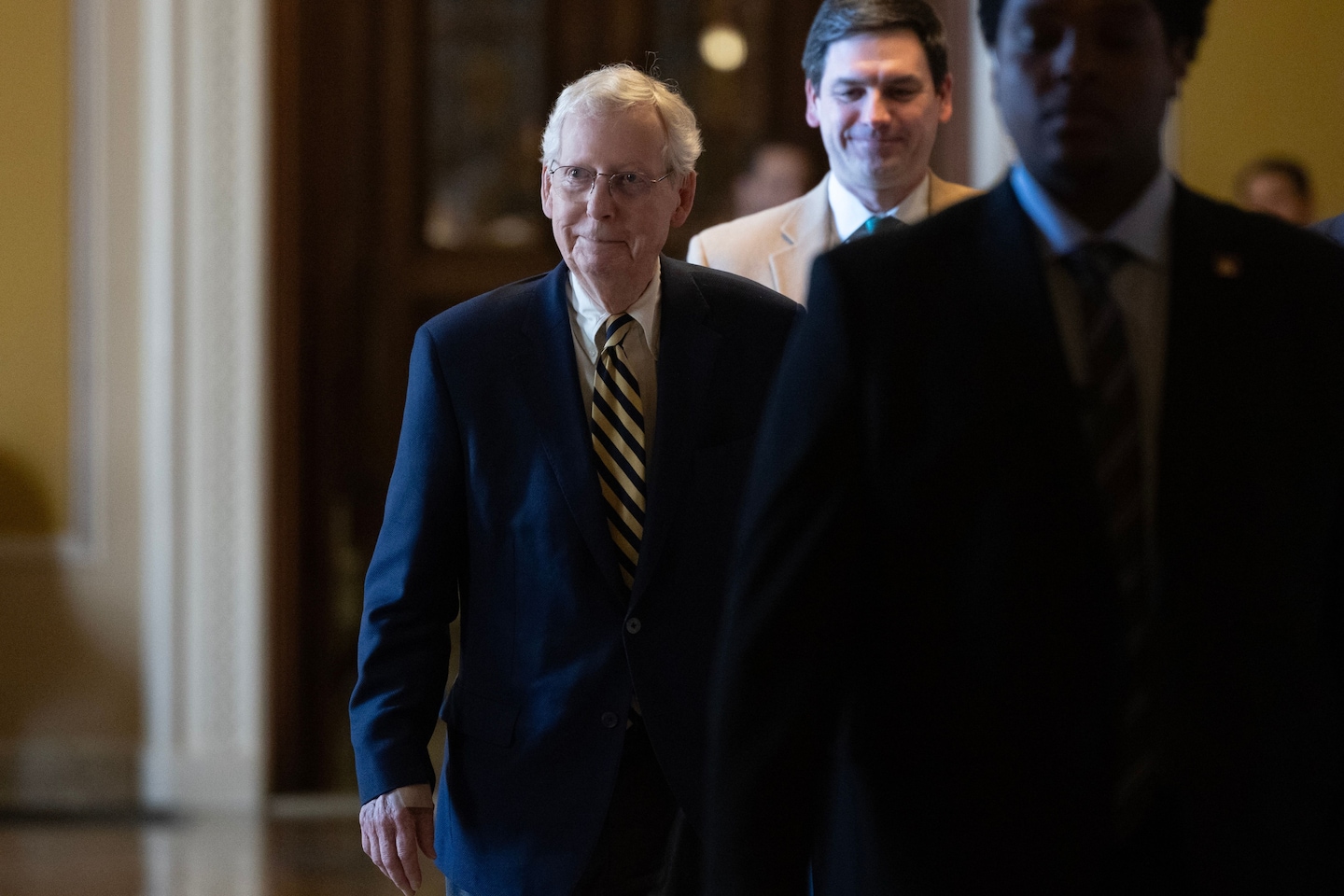Legal argumentation naturally adopts a veneer of seriousness, regardless of how unserious the issues under consideration might be.
Politics
The court ruling on immunity also rejected Trump’s impeachment rhetoric – The Washington Post

The claim from former president Donald Trump’s legal team that he should be offered blanket immunity against federal charges brought by special counsel Jack Smith in Washington was not generally viewed as particularly serious. Instead, it was often seen simply as a way to delay the criminal trial ahead of the presidential election. Should Trump win that election, after all, the legal issue goes away.
The arguments used to bolster the immunity claim — that, for example, his impeachment in the wake of the Capitol riot in 2021 meant that further prosecutions posed a “double jeopardy” threat — similarly prompted eye-rolling among experts. But the D.C. Circuit Court still needed to consider and parse those arguments, offering a detailed rebuttal to what Trump’s attorneys and allies had put forward.
In its ruling on the question, made public Tuesday morning, the court dismissed the idea that Trump’s impeachment was an obstruction to his criminal prosecution. In doing so, it also undercuts a common refrain about the impeachment from Trump — and dinged some of the senators who rose to Trump’s defense.
Trump’s attorneys had tried to block the D.C. prosecution by noting that his impeachment in the House after the Jan. 6, 2021, riots had been followed by a Senate trial that culminated in acquittal. The Fifth Amendment protects people from being tried twice for the same crime so, they argued, the former president couldn’t be criminally charged by the special counsel.
The court’s rejection of this argument was direct: “(1) An impeachment does not result in criminal punishments; and (2) the Indictment does not charge the same offense as the single count in the Impeachment Resolution.”
“Impeachment,” the ruling states, “is a political process that is instigated and overseen by the Congress.” This is true — and something that Trump has at times tried to gloss over. He likes to suggest that the impeachments he faced were solely a function of Democratic political action (as opposed to also being rooted in actual wrongdoing on his part) but then to treat his two acquittals as apolitical exonerations of his actions. They were not.
The ruling pointed this out.
“As a result of the political nature of impeachment proceedings, impeachment acquittals are often unrelated to factual innocence,” the court wrote.
“Former President Trump’s acquittal in his impeachment trial on the charge of inciting insurrection makes this point. The forty-three Senators who voted to acquit him relied on a variety of concerns, many of which had nothing to do with whether he committed the charged offense,” it said.
The ruling walks through the hodgepodge of reasons offered by the senators. Some were procedural, as with Sen. Todd Young’s (R-Ind.) complaint that the House rushed the impeachment itself. Some were political, such as Sen. Ron Johnson’s (R-Wis.) disparagement of the impeachment as “vindictive and divisive.” Thirty senators, the ruling noted, had objected to the impeachment because by the time the trial was conducted, Trump wasn’t president anymore — what the court dubbed “jurisdictional” objections.
Those same senators — including Senate Minority Leader Mitch McConnell (R-Ky.) — got another call-out in the ruling. Trump’s attorneys had argued that Trump couldn’t be criminally charged unless had first been impeached and convicted. If that were the case, the court wrote, and if those senators’ jurisdictional concerns were valid reasons not to convict, it would mean that no former president could ever be convicted of a crime committed in office. If you have to impeach before indicting, and you can’t impeach someone out of office, that’s that. Exoneration ad absurdum.
That “Impeachment is not a criminal process and cannot result in criminal punishment” by itself suggested that the Fifth Amendment’s protection against double jeopardy didn’t apply, the court argued. Trump “does not seriously contend otherwise,” the ruling continues, “and he does not explain why he believes that impeachment can implicate ‘double jeopardy principles’ when it does not involve criminal punishment.” Those scare quotes might justifiably be viewed as judicial eye-rolling.
There’s no mystery about why Republican senators declined to convict Trump during the impeachment trial in February 2021. Even by then, it was clear to Hill Republicans that their base was sticking with Trump — meaning that there was a political cost to be paid in trying to hold him to account. Some voted to convict Trump anyway, earning wrath from Trump and the base.
Then, trying to block his criminal indictment, Trump tried to use those senators as a shield a second time. His attorneys argued that the senators’ decisions were so weighted with importance that they were the equivalent of a judgment of a jury. So the court had little choice but to point out that, no, they weren’t. They were just politicians doing politics.
Politics
Youri Chassin quits CAQ to sit as Independent, second member to leave this month

Quebec legislature member Youri Chassin has announced he’s leaving the Coalition Avenir Québec government to sit as an Independent.
He announced the decision shortly after writing an open letter criticizing Premier François Legault’s government for abandoning its principles of smaller government.
In the letter published in Le Journal de Montréal and Le Journal de Québec, Chassin accused the party of falling back on what he called the old formula of throwing money at problems instead of looking to do things differently.
Chassin says public services are more fragile than ever, despite rising spending that pushed the province to a record $11-billion deficit projected in the last budget.
He is the second CAQ member to leave the party in a little more than one week, after economy and energy minister Pierre Fitzgibbon announced Sept. 4 he would leave because he lost motivation to do his job.
Chassin says he has no intention of joining another party and will instead sit as an Independent until the end of his term.
He has represented the Saint-Jérôme riding since the CAQ rose to power in 2018, but has not served in cabinet.
This report by The Canadian Press was first published Sept. 12, 2024.
The Canadian Press. All rights reserved.
Politics
‘I’m not going to listen to you’: Singh responds to Poilievre’s vote challenge

MONTREAL – NDP Leader Jagmeet Singh says he will not be taking advice from Pierre Poilievre after the Conservative leader challenged him to bring down government.
“I say directly to Pierre Poilievre: I’m not going to listen to you,” said Singh on Wednesday, accusing Poilievre of wanting to take away dental-care coverage from Canadians, among other things.
“I’m not going to listen to your advice. You want to destroy people’s lives, I want to build up a brighter future.”
Earlier in the day, Poilievre challenged Singh to commit to voting non-confidence in the government, saying his party will force a vote in the House of Commons “at the earliest possibly opportunity.”
“I’m asking Jagmeet Singh and the NDP to commit unequivocally before Monday’s byelections: will they vote non-confidence to bring down the costly coalition and trigger a carbon tax election, or will Jagmeet Singh sell out Canadians again?” Poilievre said.
“It’s put up or shut up time for the NDP.”
While Singh rejected the idea he would ever listen to Poilievre, he did not say how the NDP would vote on a non-confidence motion.
“I’ve said on any vote, we’re going to look at the vote and we’ll make our decision. I’m not going to say our decision ahead of time,” he said.
Singh’s top adviser said on Tuesday the NDP leader is not particularly eager to trigger an election, even as the Conservatives challenge him to do just that.
Anne McGrath, Singh’s principal secretary, says there will be more volatility in Parliament and the odds of an early election have risen.
“I don’t think he is anxious to launch one, or chomping at the bit to have one, but it can happen,” she said in an interview.
New Democrat MPs are in a second day of meetings in Montreal as they nail down a plan for how to navigate the minority Parliament this fall.
The caucus retreat comes one week after Singh announced the party has left the supply-and-confidence agreement with the governing Liberals.
It’s also taking place in the very city where New Democrats are hoping to pick up a seat on Monday, when voters go to the polls in Montreal’s LaSalle—Émard—Verdun. A second byelection is being held that day in the Winnipeg riding of Elmwood—Transcona, where the NDP is hoping to hold onto a seat the Conservatives are also vying for.
While New Democrats are seeking to distance themselves from the Liberals, they don’t appear ready to trigger a general election.
Singh signalled on Tuesday that he will have more to say Wednesday about the party’s strategy for the upcoming sitting.
He is hoping to convince Canadians that his party can defeat the federal Conservatives, who have been riding high in the polls over the last year.
Singh has attacked Poilievre as someone who would bring back Harper-style cuts to programs that Canadians rely on, including the national dental-care program that was part of the supply-and-confidence agreement.
The Canadian Press has asked Poilievre’s office whether the Conservative leader intends to keep the program in place, if he forms government after the next election.
With the return of Parliament just days away, the NDP is also keeping in mind how other parties will look to capitalize on the new makeup of the House of Commons.
The Bloc Québécois has already indicated that it’s written up a list of demands for the Liberals in exchange for support on votes.
The next federal election must take place by October 2025 at the latest.
This report by The Canadian Press was first published Sept. 11, 2024.
The Canadian Press. All rights reserved.
Politics
Social media comments blocked: Montreal mayor says she won’t accept vulgar slurs

Montreal Mayor Valérie Plante is defending her decision to turn off comments on her social media accounts — with an announcement on social media.
She posted screenshots to X this morning of vulgar names she’s been called on the platform, and says comments on her posts for months have been dominated by insults, to the point that she decided to block them.
Montreal’s Opposition leader and the Canadian Civil Liberties Association have criticized Plante for limiting freedom of expression by restricting comments on her X and Instagram accounts.
They say elected officials who use social media should be willing to hear from constituents on those platforms.
However, Plante says some people may believe there is a fundamental right to call someone offensive names and to normalize violence online, but she disagrees.
Her statement on X is closed to comments.
This report by The Canadian Press was first published Sept. 11, 2024.
The Canadian Press. All rights reserved.
-

 Sports24 hours ago
Sports24 hours agoCanada’s Stakusic, partner Savinykh lose in doubles quarterfinals at Guadalajara Open
-

 News4 hours ago
News4 hours agoRCMP say 3 dead, suspects at large in targeted attack at home in Lloydminster, Sask.
-

 News24 hours ago
News24 hours agoSouthern Baptist trustees back agency president but warn against needless controversy
-

 News4 hours ago
News4 hours agoNova Scotia adopts bill declaring domestic violence in the province an epidemic
-

 News14 hours ago
News14 hours agoCanadanewsmedia news September 12, 2024: Air Canada pilot strike looms, BC transit strike talks resume
-

 News3 hours ago
News3 hours agoHall of Famer Joe Schmidt, who helped Detroit Lions win 2 NFL titles, dies at 92
-
News13 hours ago
Local Toronto business story – Events Industry : new national brand, Element Event Solutions
-

 News3 hours ago
News3 hours agoB.C. to scrap consumer carbon tax if federal government drops legal requirement: Eby

























